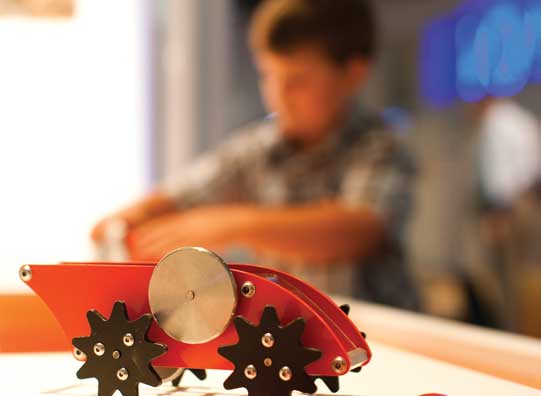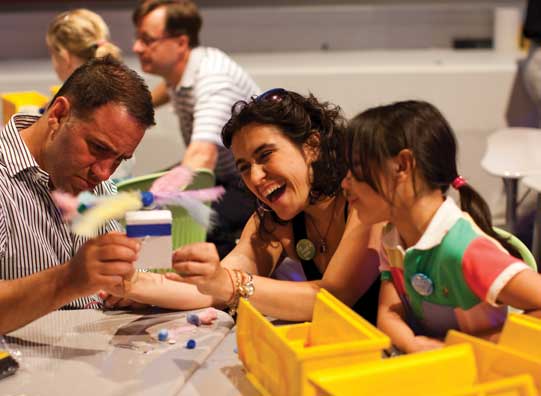 Fall 2009
Fall 2009|
“Our students are motivated to show off what they’ve done…and there’s no one better to talk to other kids about how cool and rewarding this kind of activity can be.” -Robert Harris, math teacher, City Charter High School |
Robots Rule
In roboworld’s™ Robot Workshop, student and grown-up robot buffs share their smarts and their enthusiasm with Science Center visitors.
There’s fun—and learning—for all ages in the Robot Workshop. Flanked by a couple of spunky preschoolers, Rebecca Giles grips a homemade, sandwich-sized robot, likening its battery to candy that gives the children energy. “Cool,” shouts one of the kids, which is exactly the point.Tucked inside Carnegie Science Center’s new permanent roboworld™ exhibit that’s all about ‘bots is a hands-on workshop that allows visitors to explore robotics technology, even as it’s being developed. Amateur and professional roboticists—and those in training—learn from one another. And, at its most basic level, the workshop introduces the ideas and language of robotic programming to the curious, no matter their age or science know-how. The lessons come in many forms—from a close encounter with Pleo, a robotic baby Camarasaurus, that takes on a certain personality depending upon how well you treat it; to a self-guided build-your-own “boogie bug bot,” a simple motor and circuit robot with a battery for an energy source (which, for a small fee, you can also “adopt” and take home); to the more advanced “battle ‘bot” demonstrations that are put on by tech-savvy high schoolers. “Breaking down the science, especially for young kids, so that they understand it can be fun and interesting and not intimidating, is important,” says Giles, a California University of Pennsylvania (CALU) senior who will graduate in December with a bachelor of science in technology education. “I didn’t have these kinds of opportunities when I was little, so seeing their faces when you show them how the technology works—3-year-olds all the way up to their parents—is really rewarding.” Giles and other California University students, faculty, and staff from its National Center for Robotics Engineering Technology Education volunteer in the family-friendly Robot Workshop on weekends as part of the university’s ongoing relationship with the Science Center. So far, they’ve hosted a handful of activities, including a session titled “Robots n’at,” designed for kids ages 5 to 14 to learn the basic principles of programming a robot to respond to simple commands. Next up, Sept. 12-13, is “Battling ‘bots,” where kids can take the controls and learn how to drive a combat robot into battle. It’s a partnership that helps set the Science Center apart in informal learning, says Apryl Peroney, program development coordinator for science and education at the North Shore museum. “The schools that we’re partnering with in the workshop—CALU, Carnegie Mellon, and City Charter High School—provide professionals who can answer real-world robotics questions, and their students are easily-relatable role models for many of our visitors,” says Peroney. For students like Giles and those even younger at City Charter High School, a technology-infused public school, it’s an invaluable opportunity to share their ‘bot know-how from inside roboworld, the world’s largest permanent robotics exhibit. In addition to the Robot Workshop, roboworld houses more than 30 displays of all things robotic, including Carnegie Mellon’s star-studded Robot Hall of Fame®. “Our students are motivated to show off what they’ve done,” says City High math teacher Robert Harris, who is also a mentor for Short Circuits, the school’s award-winning robotics team. “They’ve put the time and effort into it. And there’s no one better to talk to other kids about how cool and rewarding this kind of activity can be.” This past March, the Short Circuits won the 2009 FIRST Pittsburgh Regional Robotics Competition, beating out 34 other teams for a chance to compete nationally in Atlanta, Georgia. FIRST was founded by Segway inventor Dean Kamen in 1989 as a way to inspire young people’s interest in science and technology, and has a worldwide following. Each year, teams have a different set of obstacles to maneuver with their robots, which they have six weeks to build, mostly from a standard kit of parts. Students work in teams to design, build, program, and market their creations (City High adds a marketing component as a business lesson). Now, thanks to roboworld, they can add the role of mentor to their stacked portfolios, as seasoned Short Circuit members use their self-built robots to train their younger classmates—and educate the public—as part of the Robot Workshop.  Bossa Nova Robotics, a Pittsburgh-based company and Carnegie Mellon spin-off, has also gotten into the act, debuting fresh-off-the-development-block toys made with the latest robotics technology, such as: Prime-8, a cleverly obnoxious robotic gorilla that combines speed and attitude to perform a whopping 100 functions; and Penbo, a cute and fuzzy waddling penguin that speaks fluent “Penguish” and lays eggs that hatch “Bebe Penbo” that interact with mom by singing a duet or playing peek-a-boo. “There’s really something for everyone,” says Brad Peroney, education coordinator at the Science Center, of the daily offerings in the workshop. “A lot of the activities provide a good chance for siblings, or parents and kids, to work together on a project where they both learn something.” |
Also in this issue:
Poster Boy · The Whales' Tale · Insect Appellant · Destination Pittsburgh · Presidentís Note · NewsWorthy · Now Showing · Face Time: Jason Busch · About Town: The Art of Change · Field Trip: Virtual Field Trip · Artistic License: Word Play · The Big Picture
 |
Copyright © 2017 CARNEGIE Magazine. All rights reserved. |

